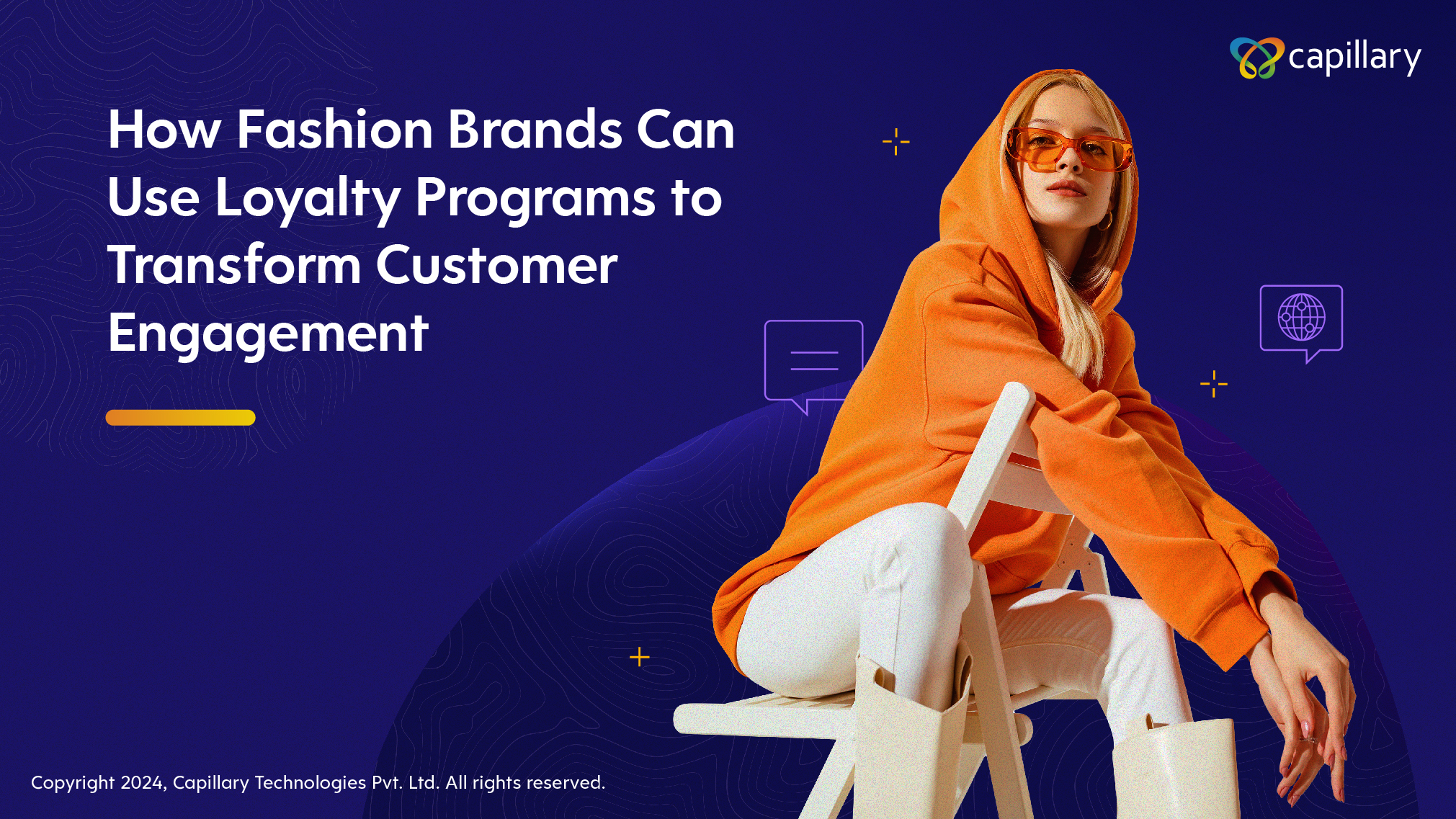- Design industry shaping loyalty programs
- Integrate easily and go live quicker
- Deliver hyper-personalized consumer experiences
Blue Rewards from Al Futtaim Group Shares Loyalty Success Stories and Evolution. Watch Podcast >
Capillary Triumphs with 4 Prestigious Wins at the 2025 International Loyalty Awards! Read more >

A constant state of uncertainty, economic restraints, persistent inflation, and weak consumer confidence.
According to McKinsey’s ‘The State of Fashion’ report 2024, these are the major challenges looking at the face of fashion businesses across the globe.
With these challenges looming large, fashion companies, both luxury and non-luxury sectors, need to adapt to the technological shifts, capitalize on the right opportunities, predict upcoming trends to cater to the changing consumer preferences and thrive in the competitive landscape that 2024 will present. And at the helm of this are fashion loyalty programs.
There could not be a better time for fashion retailers to dive into the world of loyalty programs. Loyalty programs are not just a contingency plan for fashion retailers, but an assurance for a long-lasting business. In the face of economic uncertainty and rapid technological advancements, loyalty programs lay the platform for brands to nurture customer relationships, and seamlessly tackle all the challenges that the current climate poses.
Wondering how exactly loyalty programs make this happen? Read along to find out 5 ways fashion loyalty programs ditching the one-size-fits-all approach and are transforming the industry for good
The key to any great loyalty program lies in making it personal. When it comes to fashion retail, personalization can include anything from tailoring product recommendations that best match your customers to curating customized rewards that excite them.
Some fashion retailers are taking their personalization to the next level by offering personalized styling suggestions. The best example of this would be UNIQLO’s membership program. When a customer registers on their membership app and fill in their details such as gender, age, size preferences, and style preferences, UNIQLO uses it along with other data like purchase history, to create personalized styling suggestions for their customers.
When it comes to sending out personalized messaging, fashion brands also leverage the power of omnichannel communication. With omnichannel communication, retailers can transcend beyond the traditional single-channel approach to offer more personalized communications across all possible channels when and where the customers are most active. Whether browsing online, visiting a store, or using a mobile app, brands can integrate personalized communications across all customer touch points. Taking it a notch higher are nudges that help you send the right message to the right customer at the right time.
This is the era of conscious shoppers. Value-motivated consumerism is the new buzzword in town with shoppers showing affinity towards brands that align with their value systems.
According to a survey, 63% of respondents say that sustainability is crucial for staying loyal to a brand. By incorporating sustainability into their loyalty programs, fashion brands can build customer loyalty and advocacy through shared values.
Famous fashion retailer H&M has earned a reputation for adding a sustainability angle to their loyalty programs. They reward their members for aligning with the company’s broader sustainability efforts. Bringing your own bags, recycling your old clothes, and opting for climate-smart delivery are a few of the options where their members get rewarded for conscious choices.
Such incentives cater to consumers who increasingly demand transparency and accountability from the brands they support.
Making sustainability a part of their loyalty programs has the potential to shift from solely transactional interactions to fostering deeper, more personalized relationships, where customers feel seen, heard, and understood.
Who doesn’t like to feel special? Loyalty programs offer a great opportunity for fashion brands to make their customers feel special and valued through exclusive incentives.
Calling dibs on member-only sales, offering an advanced sneak peek at the upcoming designs on these sales, and invitations to industry events, are just a few of the many possible ways brands can make sure to keep their loyal customers on the pedestal.
Arvind is one of the fashion brands that is making waves within this segment with their loyalty programs. It has several major brands within its umbrella and with its tiered-based loyalty program, Arvind offers a lot to its premium customers. Early access to End of Season Sale (EOSS), and exclusive seasonal and personalized campaigns where they offer relevant offers on the entire purchase of the customer, etc. would be a few to mention. This way they are able to create a feeling of exclusivity among their premium members and encourage their customers to jump to this premium status.
There’s a lot of space for brands to get innovative here with their incentives. Did you know that Myntra’s loyalty program, Myntra Insider offers a members-only stylist consultation? For a segment of customers that is looking to identify the best styles that suit them, such offers are too compelling to resist.
Is the future of retail brick-and-mortar stores or digital storefronts?
This is a question several fashion retailers have been grappling with for quite some time. And the answer to this question lies in this one word- “phygital”.
Phygital shopping allows the customer to seamlessly switch between offline and online touchpoints, thus bringing the best of both worlds.
Let’s say you’re scrolling through a fashion retailer’s website and come across a dress you like. Instead of making an immediate purchase online, you decide to visit the brand’s physical store to try them on. Impressed by how the dress fits and looks, you decide to make a purchase. At the checkout counter, you use your smartphone to complete the transaction, earning loyalty points that you can use for future online or in-store purchases.
By blending offline and online shopping experiences, phygital shopping is creating the next big wave in the way customers interact with brands.
Making the phygital experience a part of the loyalty program allows customers to:
– redeem their rewards across both offline and online stores
– check a product online and then go to the physical store to try on
– shop through live streams
– pay through digital wallets
– get live updates while customers are still in the store, and many more.
According to a Forrester study, phygital experience led to a 17% increase in lead conversion and a whopping 59% increase in cross-sell and upsell ratio. The most telling piece of this data is how phygital experience boosts the business of brands along with creating satisfying customer experience.
To know more about phygital shopping, read our blog
Getting a 360-degree view of the customers is a cornerstone for creating a seamless phygital experience, and that demands the availability of an efficient customer data platform that can help unlock value for your customers. Capillary’s Customer Data Platform called CDP+ is one of the most comprehensive intelligence software out there that gathers data from different touchpoints and pieces them together to create a single view of your customer.
Learn more about Capillary’s Customer Data Platform
A great Greek philosopher once said that “change is the only constant”. The same applies even in the fashion scene.
Every now and then, new trends pick up and people’s interest in outfits and style keeps changing accordingly. This is one of the key challenges faced by fashion retailers. But with AI-powered loyalty programs or generative loyalty as we like to call it at Capillary, staying up to date on these changing dynamics can’t get easier.
Through sophisticated data collection and analytics capabilities, these programs enable fashion retailers to not only understand current trends but also anticipate future shifts in consumer preferences and predict their buying behavior. These programs harness AI algorithms to analyze vast amounts of customer data, including purchase history, browsing behavior, and social media interactions, enabling brands to adapt their product offerings and marketing strategies swiftly.
AI is also playing a crucial role in enhancing customer service with advanced chatbots and virtual assistants that help customers with their queries in real-time.
As the fashion retail landscape continues to evolve, loyalty programs emerge as the lynchpin for sustainable growth and customer engagement. At Capillary Technologies, we’re at the forefront of revolutionising fashion retail, leveraging our cutting-edge AI-powered solutions to create loyalty programs that help win customers’ hearts and wallets.
Contact us today to discover how Capillary can help you create best-in-class loyalty programs that elevate your brand and deliver exceptional customer experiences.
1: How do loyalty programs benefit fashion retailers?
Loyalty programs benefit fashion retailers by increasing customer retention, encouraging repeat purchases, and providing valuable customer data for personalized marketing.
2: What are the key features of effective fashion retail loyalty programs?
Key features of effective fashion retail loyalty programs include personalized rewards, tiered membership levels, exclusive discounts, and seamless integration with online and offline channels.
3: How can fashion retailers design successful loyalty programs?
Fashion retailers can design successful loyalty programs by understanding their customer base, offering relevant rewards, and leveraging technology for program management and data analysis.
4: How do loyalty programs impact customer experience in fashion retail?
Loyalty programs enhance customer experience by providing personalized incentives, fostering a sense of community, and making customers feel valued and appreciated.
5: How can technology enhance loyalty programs in fashion retail?
Technology enhances loyalty programs in fashion retail by enabling personalized rewards, tracking customer behavior, and facilitating seamless communication and engagement through mobile apps and digital platforms.

December 13, 2024 | 6 Min Read
As consumer expectations evolve, leveraging AI in fashion be

March 7, 2025 | 4 Min Read
In the face of economic uncertainty and rapid technological